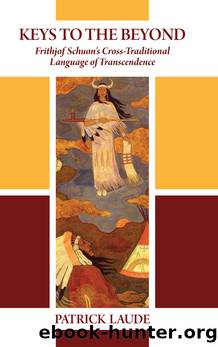Keys to the Beyond by Laude Patrick;

Author:Laude, Patrick;
Language: eng
Format: epub
Publisher: State University of New York Press
Published: 2020-03-14T16:00:00+00:00
1. This includes the growing field of study of the transformation of Sufism in western contexts. William Rory Dicksonâs Living Sufism in North America: Between Tradition and Transformation (Albany: State University of New York Press, 2005) is an interesting study that shows, through a series of interviews with contemporary Sufi Shaykhs, the ways in which Sufism has adapted its traditional principles to contemporary realities.
2. Louis Massignon, Essay on the Origins of the Technical Language of Islamic Mysticism (Notre Dame, IN: University of Notre Dame Press, 2003).
3. âThe teaching of Frithjof Schuon is at once metaphysical, esoteric, traditional, and perennial. ⦠This âuniversalistâ or perennialist dimension is summed up in the assertion that there is a âtranscendent unity of religions.â â James Cutsinger, Advice to the Serious Seeker: Meditations on the Teaching of Frithjof Schuon (Albany: State University of New York Press, 1997), 193.
4. Schuon, Understanding Islam (Bloomington, IN: World Wisdom, 2011), xvii.
5. Foremost among these readings of Schuon, one must mention Seyyed Hossein Nasrâs comprehensive study âFrithjof Schuon and the Islamic Tradition,â SophiaâThe Journal of Traditional Studies 5, no. 1 (Summer 1999): 27â48.
6. Let us note that Schuonâs view of the place and modalities of Sufism in the West was, in this respect, quite divergent from René Guénonâs. In a letter written to Michel Valsân in 1960, Schuon distinguishes most clearly between Sufism as understood by Guénonâan understanding which would be echoed later on, mutatis mutandis, by Seyyed Hossein Nasr, and his own concept and practice of synthetic and quintessential Sufism: âFor Guénon ⦠[Sufism] could only be an extension of Shadhilism implanted in the West; for ⦠[me] on the contrary ⦠[it] must realize both a synthesis and a quintessence determined on the one hand by the awareness of the metaphysical significance of forms and on the other hand by the contingencies of the modern world, with the simplifications and compensations this implies.â Pully, Switzerland, October 9, 1960, letter to Michel Vâlsan, in Letters of Frithjof Schuon: Reflections on the Perennial Philosophy, edited by Michael Oren Fitzgerald (Bloomington, IN: World Wisdom, 2019).
7. Schuon, Gnosis: Divine Wisdom (Blomington, IN: World Wisdom, 2006), 20.
8. âReligious loyalty is nothing else than the sincerity of our human relations with God, on the basis of the means which He has put at our disposal; these means, being of the formal order, ipso facto exclude other forms without for all that lacking anything whatsoever from the point of view of our relationship with Heaven; in this intrinsic sense, form is really unique and irreplaceable, precisely because our relationship with God is so. Nevertheless, this uniqueness of the intrinsic support and the sincerity of our worship within the framework of this support do not authorize for us what we might call âreligious nationalismâ; if we condemn this attitudeâinevitable for the average man, but this is not the questionâit is because it implies opinions contrary to the truth, which are all the more contradictory when the believer lays claim to an esoteric wisdom and claims that
Download
This site does not store any files on its server. We only index and link to content provided by other sites. Please contact the content providers to delete copyright contents if any and email us, we'll remove relevant links or contents immediately.
The 5 Love Languages: The Secret to Love That Lasts by Gary Chapman(9299)
The Space Between by Michelle L. Teichman(6588)
Assassin’s Fate by Robin Hobb(5867)
Wiseguy by Nicholas Pileggi(5334)
Everything Happens for a Reason by Kate Bowler(4486)
Gerald's Game by Stephen King(4386)
Pillow Thoughts by Courtney Peppernell(4034)
A Simplified Life by Emily Ley(3975)
The Power of Positive Thinking by Norman Vincent Peale(3871)
Resisting Happiness by Matthew Kelly(3204)
Girl, Wash Your Face by Rachel Hollis(3130)
Harry Potter and the Prisoner of Azkaban (Book 3) by J. K. Rowling(3125)
Being Aware of Being Aware by Rupert Spira(3092)
Real Sex by Lauren F. Winner(2876)
The Code Book by Simon Singh(2873)
More Language of Letting Go: 366 New Daily Meditations by Melody Beattie(2860)
Name Book, The: Over 10,000 Names--Their Meanings, Origins, and Spiritual Significance by Astoria Dorothy(2849)
The Holy Spirit by Billy Graham(2783)
The Secret Power of Speaking God's Word by Joyce Meyer(2762)
